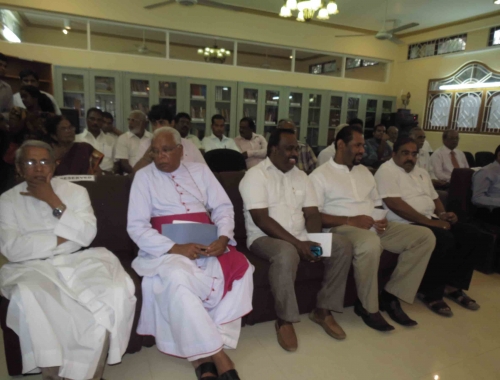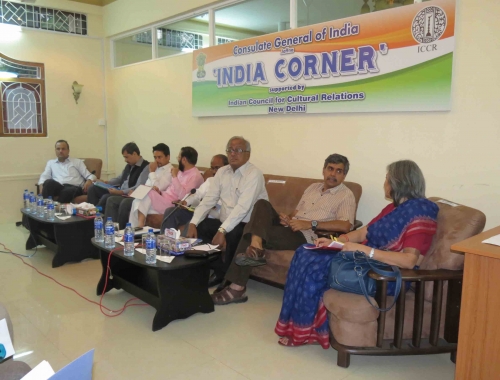 by Meera Srinivasan, ‘The Hindu,’ April 12, 2013
by Meera Srinivasan, ‘The Hindu,’ April 12, 2013
The obsession with the 13th amendment to the Sri Lankan Constitution will hardly help the Tamils, politicians and activists in northern Srilanka told the Indian parliamentary delegation, which wound up its visit to Sri Lanka on Thursday.
While members of the Indian delegation were rather reluctant to speak to the media here, enquiries with political parties, academics and civil society members who met the delegation revealed that the discussions gave the Indian parliamentarians an opportunity to listen to different perspectives, agendas and concerns in Colombo and in Jaffna.
In Colombo, the parliamentarians met senior members of the government, including Sri Lanka’s External Affairs Minister G.L. Peiris, Defence Secretary Gotabaya Rajapaksa, Economic Development Minister Basil Rajapaksa and Speaker Chamal Rajapaksa. On the interactions, Cabinet Minister Anura Priyadarshana Yapa said: “It is always useful to have delegations come over, for they can assess the situation objectively.
Many in India – both at the Centre and in Tamil Nadu – are not aware of the progress we have made here post-war. The Indian MPs, who met a wide range of leaders and activists, will understand the intentions of the different groups they met,” he said.
In Jaffna, where the MPs spent nearly two days, the emphasis was on the need for transitional administration and for India to shed its “obsession with” the 13th Amendment — which followed the Indo-Lanka accord of 1987 — as it was “inadequate”.
Civil society groups said starting with a clean slate would work better.
K. Guruparan, lecturer of Law, Jaffna University, said: “We told them that the 13th Amendment in itself had several contradictions and explained how, constitutionally, it would be difficult to implement anything beyond the 13th Amendment.” Mr. Guruparan, and Tamil National People’s Front (TNPF) member and lawyer Gajendrakumar Ponnambalam, reportedly emphasised that the 13th Amendment was not an adequate starting point in addressing the problems of the Tamils. TNPF general secretary S. Kajendran said the MPs paid great attention to every word spoken. “We hope that they take our message back to the Indian government. India has to intervene and ensure there is no discrimination based on ethnicity,” he said.
 The 13th amendment made to Sri Lanka’s Constitution in November 1987, provides for devolution of limited power to provinces.
The 13th amendment made to Sri Lanka’s Constitution in November 1987, provides for devolution of limited power to provinces.
It has been implemented everywhere except in the Tamil-majority North.
On discussions with members of the Tamil National Alliance (TNA), an umbrella organisation of parties representing Tamils of the Northern Province. President of TNA Suresh Premachandran said: “We told the visiting MPs that the ongoing genocide has to end here. There are serious livelihood issues prompting Tamils to leave the country. We need an interim administration, overseen by India or the United Nations, until there is a final political settlement for the Tamils.”
According to Mr. Guruparan, one of the BJP MPs asked them if the Northern Provincial Council elections would provide a “window of opportunity.” In response, civil society members are said to have prescribed a “transitional administration” model, outside the current Sri Lankan Constitution, as an alternative, where in Tamil representatives have actual powers in realms of education, health and livelihood issues. “In this model, the Sri Lankan government will also have a role and so will representatives of various communities. If the government is willing to engage with this option, we could work out the modalities,” he said.
The Indian MPs had also met members of the main opposition party, United National Party (UNP), including its leader Ranil Wickremesinghe, who had recently visited India. According to sources with the UNP – which is affiliated to the United National Front (UNF) – Mr. Wickremesinghe underscored the urgent need for democracy and devolution, in addressing problems facing the country.
The five parliamentarians — Saugata Roy (Trinamool Congress), Sandeep Dikshit (Congress), Anurag Thakur (BJP), Dhananjay Singh (BSP) and Prakash Javadekar (BJP), were for a ‘Track Two political dialogue’, initiative of the Federation of Indian Chambers of Commerce and Industry (FICCI).